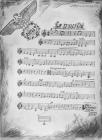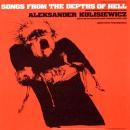Nad Wołgi falą "goniąc" Moskala,
Szlachetna trup-pa zwiewała,
Und immer naprzód, und immer weiter
A szkopów Rasija gnała.
Żegnaj mi Moskwo, żegnaj Samaro,
Mój Leningradzie daleki!
Oj, jubel minie, kiedy na Krymie
Zerźną mnie w portki na wieki.
Ja, ja -ist stimmt das...
Żegnani was góry, góry Uralu
I ciebie z twoją armadą.
Ty jesteś Stalin -Stalin ze stali,
Ja jestem impotent - Adolf.
Prashchay więc wdzięczna mi Europo
Za moją “Arbeit und Freude”!
Gdzieś w siódmym niebie,
pod siódmym płotem,
Może za żonę cię pojmę.
Adieu też wszystkie śwabskie dziewice,
Któraż mi karty rozłoży?
Chlopak ja byłem dumny i święty,
Bom nigdy nie cudzo-włożył.
Sieg Heil, General-mój Gówner-nament!,
Dobroci dzieło ogromne.
Emeryturę sutą dostaniesz
Za goebbelsiowski mój Bromberg.
Gitara brzękła, Germania jękła,
Victoria zmarzła wśród tundry.
A oś Adolfa jak Bardia pękła
I został znów bezprizorny.
Szlachetna trup-pa zwiewała,
Und immer naprzód, und immer weiter
A szkopów Rasija gnała.
Żegnaj mi Moskwo, żegnaj Samaro,
Mój Leningradzie daleki!
Oj, jubel minie, kiedy na Krymie
Zerźną mnie w portki na wieki.
Ja, ja -ist stimmt das...
Żegnani was góry, góry Uralu
I ciebie z twoją armadą.
Ty jesteś Stalin -Stalin ze stali,
Ja jestem impotent - Adolf.
Prashchay więc wdzięczna mi Europo
Za moją “Arbeit und Freude”!
Gdzieś w siódmym niebie,
pod siódmym płotem,
Może za żonę cię pojmę.
Adieu też wszystkie śwabskie dziewice,
Któraż mi karty rozłoży?
Chlopak ja byłem dumny i święty,
Bom nigdy nie cudzo-włożył.
Sieg Heil, General-mój Gówner-nament!,
Dobroci dzieło ogromne.
Emeryturę sutą dostaniesz
Za goebbelsiowski mój Bromberg.
Gitara brzękła, Germania jękła,
Victoria zmarzła wśród tundry.
A oś Adolfa jak Bardia pękła
I został znów bezprizorny.
envoyé par Riccardo Venturi - 30/7/2020 - 16:59
Langue: anglais
ADOLF'S FAREWELL TO THE WORLD
By Volga's waters, "chasing" the Russkies,
The noble troop-p-ps were buggering off!
“And ever forward, and ever further"-
While Mother Russia was whipping the Krauts!
Bid farewell to me Moscow, farewell Samara,
My distant Leningrad, farewell!
Oh, soon the party will be over, when in Crimea,
They'll take the crap out of me for good.
Ja, ja -ít's really true...
Farewell to you mountains, fair Ural Mountains,
You with your army, I bid farewell.
You are Stalin, man-of-steel Stalin,
I'm just an impotent Adolf.
Farewell, then, Europe,
So grateful for my “Arbeit und Freude"!
In the Seventh Heaven, beneath the seventh fence,
Perhaps I shall take you as my bride.
Adieu to you, too, all you Kraut virgins,
Who'll read the cards for me now?
I was a proud and saintly boy,
I never stuck it where it didn't belong!
Sieg Heil, my General-Gouvernexcrement!
Magnificent creation of goodness.
A handsome pension you'll receive,
For my -as Goebbels would say- "Bromberg!'
A guitar plinked, Germania sighed;
Victoria froze on the tundra!
Adolf's axis broke, like Bardia,
And he was left orphaned, homeless again.
By Volga's waters, "chasing" the Russkies,
The noble troop-p-ps were buggering off!
“And ever forward, and ever further"-
While Mother Russia was whipping the Krauts!
Bid farewell to me Moscow, farewell Samara,
My distant Leningrad, farewell!
Oh, soon the party will be over, when in Crimea,
They'll take the crap out of me for good.
Ja, ja -ít's really true...
Farewell to you mountains, fair Ural Mountains,
You with your army, I bid farewell.
You are Stalin, man-of-steel Stalin,
I'm just an impotent Adolf.
Farewell, then, Europe,
So grateful for my “Arbeit und Freude"!
In the Seventh Heaven, beneath the seventh fence,
Perhaps I shall take you as my bride.
Adieu to you, too, all you Kraut virgins,
Who'll read the cards for me now?
I was a proud and saintly boy,
I never stuck it where it didn't belong!
Sieg Heil, my General-Gouvernexcrement!
Magnificent creation of goodness.
A handsome pension you'll receive,
For my -as Goebbels would say- "Bromberg!'
A guitar plinked, Germania sighed;
Victoria froze on the tundra!
Adolf's axis broke, like Bardia,
And he was left orphaned, homeless again.
envoyé par Riccardo Venturi - 30/7/2020 - 17:07
Langue: italien
Traduzione italiana / Italian translation / Traduction italienne / Italiankielinen käännös:
Riccardo Venturi, 30-07-2020 17:08
Riccardo Venturi, 30-07-2020 17:08
L'ADDIO DI ADOLFO AL MONDO
Presso le acque del Volga, “cacciando” i russi, [1]
Le nobili truu-up-pe si stavan levando dai coglioni!
“E ancora avanti, e ancora oltre” [2]
Mentre la Russia [3] stava bacchettando i crucchi.
Addio Mosca, addio Samara,
Addio, mia lontana Leningrado!
Presto sarà festa finita, quando in Crimea
Mi faranno cacare nei pantaloni per sempre.
Ja, ja, è proprio vero...
Addio montagne, bei monti Urali,
Io dico addio a voi e alla vostra armata.
Gli è che tu sei Stalin, Stalin l'uomo d'acciaio, [4]
E io sono solo un Adolfo impotente.
E allora addio, mia Europa,
Che mi sei tanto grata per il mio “Arbeit und Freude”!
Nel Settimo Cielo, sotto il settimo reticolato,
Forse ti prenderò in isposa.
Addio anche a voi tutte, vergini crucche,
E ora chi mi leggerà le carte?
Ero un ragazzo fiero e santerello,
Non l'ho mai infilato dove non dovevo!
Sieg Heil, mio Gomerdatorato Generale!, [5]
Magnifica opera di virtù.
Riceverai una bella pensione
Per la mia “Bromberg”, come direbbe Goebbels.
Una chitarra faceva dlen dlen, la Germania piangeva,
Victoria era rimasta congelata nella tundra.
L'Asse di Adolfo si era spezzata come Bardia,
E lui era rimasto orfano, di nuovo senza casa.
Presso le acque del Volga, “cacciando” i russi, [1]
Le nobili truu-up-pe si stavan levando dai coglioni!
“E ancora avanti, e ancora oltre” [2]
Mentre la Russia [3] stava bacchettando i crucchi.
Addio Mosca, addio Samara,
Addio, mia lontana Leningrado!
Presto sarà festa finita, quando in Crimea
Mi faranno cacare nei pantaloni per sempre.
Ja, ja, è proprio vero...
Addio montagne, bei monti Urali,
Io dico addio a voi e alla vostra armata.
Gli è che tu sei Stalin, Stalin l'uomo d'acciaio, [4]
E io sono solo un Adolfo impotente.
E allora addio, mia Europa,
Che mi sei tanto grata per il mio “Arbeit und Freude”!
Nel Settimo Cielo, sotto il settimo reticolato,
Forse ti prenderò in isposa.
Addio anche a voi tutte, vergini crucche,
E ora chi mi leggerà le carte?
Ero un ragazzo fiero e santerello,
Non l'ho mai infilato dove non dovevo!
Sieg Heil, mio Gomerdatorato Generale!, [5]
Magnifica opera di virtù.
Riceverai una bella pensione
Per la mia “Bromberg”, come direbbe Goebbels.
Una chitarra faceva dlen dlen, la Germania piangeva,
Victoria era rimasta congelata nella tundra.
L'Asse di Adolfo si era spezzata come Bardia,
E lui era rimasto orfano, di nuovo senza casa.
[1] Nel testo originale, i “russi” sono denominati con il termine familiare (e spregiativo) di Moskala “moscoviti”.
[2] Il verso originale è in tedesco con l'immissione del polacco naprzód “avanti”.
[3] Nel testo originale, “Russia” è in russo secondo la sua pronuncia (Россия si pronuncia rassija). Szkop è termine spregiativo polacco per i tedeschi.
[4] Come è noto, l'appellativo “Stalin” significa “d'acciaio” in russo.
[5] Nel testo originale c'è un gioco di parole tra Gowernament “Governatorato” e gówno “merda”. Il Governatorato Generale fu l'autorità che governava la parte della Polonia non direttamente annessa al Reich, a partire dal settembre 1939. Il suo governatore, Hans Frank, fu tra gli imputati al processo di Norimberga è finì appeso per il collo il 16 ottobre 1946.
[2] Il verso originale è in tedesco con l'immissione del polacco naprzód “avanti”.
[3] Nel testo originale, “Russia” è in russo secondo la sua pronuncia (Россия si pronuncia rassija). Szkop è termine spregiativo polacco per i tedeschi.
[4] Come è noto, l'appellativo “Stalin” significa “d'acciaio” in russo.
[5] Nel testo originale c'è un gioco di parole tra Gowernament “Governatorato” e gówno “merda”. Il Governatorato Generale fu l'autorità che governava la parte della Polonia non direttamente annessa al Reich, a partire dal settembre 1939. Il suo governatore, Hans Frank, fu tra gli imputati al processo di Norimberga è finì appeso per il collo il 16 ottobre 1946.
×
![]()







Lyrics: Aleksander Kulisiewicz
Music: Polish folksong ("Nad Ebru falą")
Sachsenhausen, 1943
Testo: Aleksander Kulisiewicz
Music: Canzone popolare polacca ("Nad Ebru falą")
Soviet prisoner-of-war Andrei Sarapkin attended a remarkable recital at Sachsenhausen on May 1, 1944. He later wrote an account for the Moscow newspaper, Izvestia. It reads, in part:
In tribute to the victors at Stalingrad, Kulisiewicz introduced some Russian words into his song text: prashchay means "farewell" or “goodbye forever”; bezprizorny are abandoned children living in the streets. With the term "troop-p-ps" purposely represented as a stammer, Kulisiewicz punningly associates the "noble" German troops (Polish, trupa) with the word for "rear end' (pupa). The Russian city of Samara was an important industrial and evacuation center during World War II. "Seventh Heaven” alludes to a line in a sentimental song popular in Nazi Germany. Arbeit und Freude is a twist on the title of the propaganda periodical Freude und Arbeit (Joy and Work), published in several languages (including Polish) in the 1930s. Bromberg was the German name for the Nazi-occupied Polish city of Bydgoszcz. Bardia was a Libyan port town, the scene of a decisive British victory over Axis forces in November 1942; the retreat from North Africa signalled a major reversal for Germany, anticipating its devastating military defeat at Stalingrad in February 1943.
Il prigioniero di guerra sovietico Andrej Sarapkin tenne un notevole recital a Sachsenhausen il 1° maggio 1944. Ne scrisse poi un resoconto per il giornale moscovita Izvestia, che dice, tra l'altro:
Come tributo ai vincitori di Stalingrado, Kulisiewicz introudusse alcune parole russe nel testo: prashchay significa “addio, addio per sempre”; bezprizorny sono i bambini orfani abbandonati nelle strade. Con “trup-p-pe”, balbettato, Kulisiewicz associa con scherno le “nobili” truppe tedesche (polacco: trupa) con la parola polacca per “culo” (pupa). La città russa di Samara [dal 1935 al 1991 chiamata Kujbyšev, ndr] era un importante centro industriale e di evacuazione durante la II guerra mondiale. Il “Settimo Cielo” allude ad un verso di una canzonetta sentimentale tedesca assai popolare nella Germania nazista. Arbeit und Freude è un rovesciamento sarcastico del titolo della rivista propagandistica Freude und Arbeit (“Gioia e Lavoro”), pubblicata in diverse lingue (compreso il polacco) negli anni '30. “Bromberg” era il nome tedesco della città polacca di Bydgoszcz durante l'occupazione nazista. Bardia era una città portuale libica, teatro di una decisiva vittoria britannica sulle forze dell'Asse nel novembre 1942; la ritirata dal Nordafrica rappresentò una grave sconfitta per la Germania, anticipando la rovinosa disfatta di Stalingrado nel febbraio del 1943.
"This compact disc focuses exclusively on Kulisiewicz’s own song repertoire from Sachsenhausen. These recordings, preserved on reel-to-reel tapes by Kulisiewicz after the war, are of variable quality, reflecting the conditions in which they were produced, from home recordings to studio or concert hall productions. The selections are arranged chronologically and are intended to provide both a representative sample of Kulisiewicz’s artistic output and a sense of his personal reactions to the realities of life in a Nazi concentration camp"
1. Muzulman-Kippensammler
2. Mister C
3. Krakowiaczek 1940
4. Repeta!
5. Piosenka niezapomniana
6. Erika
7. Germania!
8. Olza
9. Czarny Böhm
10. Maminsynek w koncentraku
11. Heil, Sachsenhausen!
12. Pożegnanie Adolfa ze światem
13. Tango truponoszów
14. Sen o pokoju
15. Dicke Luft!
16. Zimno, panie!
17. Moja brama
18. Pieśń o Wandzie z Ravensbrücku
19. Czterdziestu czterech
20. Wielka wygrana!
Aleksander Kulisiewicz (1918–1982) was a law student in German-occupied Poland in October 1939 when the Gestapo arrested him for antifascist writings and sent him to the Sachsenhausen concentration camp near Berlin. A talented singer and songwriter, Kulisiewicz composed 54 songs during five years of imprisonment. After liberation, he remembered his songs as well as ones he had learned from fellow prisoners and dictated hundreds of pages of them to his nurse in a Polish infirmary. As a “camp troubadour,” Kulisiewicz favored broadsides—songs of attack whose aggressive language and macabre imagery mirrored his grotesque circumstances. But his repertoire also included ballads that often evoked his native Poland with nostalgia and patriotic zeal. His songs, performed at secret gatherings, helped inmates cope with their hunger and despair, raised morale, and sustained hope of survival. Beyond this spiritual and psychological importance, Kulisiewicz also considered the camp song to be a form of documentation. “In the camp,” he wrote, “I tried under all circumstances to create verses that would serve as direct poetical reportage. I used my memory as a living archive. Friends came to me and dictated their songs.” Haunted by sounds and images of Sachsenhausen, Kulisiewicz began amassing a private collection of music, poetry, and artwork created by camp prisoners. In the 1960s, he joined with Polish ethnographers Józef Ligęza and Jan Tacina in a project to collect written and recorded interviews with former prisoners on the subject of music in the camps. He also inaugurated a series of public recitals, radio broadcasts, and recordings featuring his repertoire of prisoners’ songs, now greatly expanded to encompass material from at least a dozen Nazi camps. Kulisiewicz’s monumental study of the cultural life of the camps and the vital role music played as a means of survival for many prisoners remained unpublished at the time of his death. The archive he created, the largest collection in existence of music composed in the camps, is now a part of the Archives of the United States Holocaust Memorial Museum in Washington, D.C.
Aleksander Kulisiewicz (1918-1982) era uno studente di giurisprudenza nella Polonia sotto occupazione tedesca quando, nell'ottobre 1939, la Gestapo lo arrestò per i suoi scritti antifascisti e lo inviò al campo di concentramento di Sachsenhausen, vicino a Berlino. Kulisiewicz era un cantautore di talento: durante i suoi cinque anni di prigionia compose 54 canzoni. Dopo la liberazione si ricordò non solo delle sue canzoni, ma anche di quelle che aveva imparato dai suoi compagni di prigionia, e dettò centinaia di pagine alla sua infermiera in un ospedale polacco. In quanto “cantastorie del campo”, Kulisiewicz prediligeva le ballate descrittive, usando un linguaggio aggressivo e brutale per riprodurre le circostanze grottesche in cui si trovava assieme agli altri; ma il suo repertorio comprendeva anche ballate che, spesso, evocavano la Polonia natia con nostalgia e patriottismo. Le sue canzoni, eseguite durante riunioni segrete, aiutarono i prigionieri a far fronte alla fame e alla disperazione, sostenendo il morale e le speranze di sopravvivenza. Oltre a rivestire un'importanza spirituale e psicologica, Kulisiewicz riteneva che le canzoni del campo fossero anche una forma di documentazione. “Nel campo”, scrisse, “ho cercato sempre di creare versi che servissero da reportage poetico diretto. Ho usato la mia memoria come un archivio vivente. Gli amici venivano da me e mi recitavano le loro canzoni.” Quasi ossessionato dai suoni e dalle immagini di Sachsenhausen, Kulisiewicz cominciò a raccogliere una collezione privata di musica, poesia e opere d'arte create dai prigionieri. Negli anni '60 si unì agli etnografi polacchi Józef Ligęza a Jan Tacina in un progetto di raccolta di interviste scritte e registrate con ex prigionieri a proposito della musica nei campi di concentramento. Cominciò anche a tenere una serie di spettacoli, trasmissioni radiofoniche e incisioni del suo repertorio di canzoni di prigionia, che si ampliarono fino a comprendere materiale proveniente da almeno una dozzina di campi. L'enorme studio di Kulisiewicz sulla vita culturale nei campi e sul ruolo decisivo che la musica vi svolgeva come strumento di sopravvivenza per molti prigionieri rimase inedito fino alla sua morte. L'archivio da lui creato, la più vasta raccolta esistente di musica composta nei campi di concentramento, fa ora parte degli archivi dell'United States Holocaust Memorial Museum a Washington.